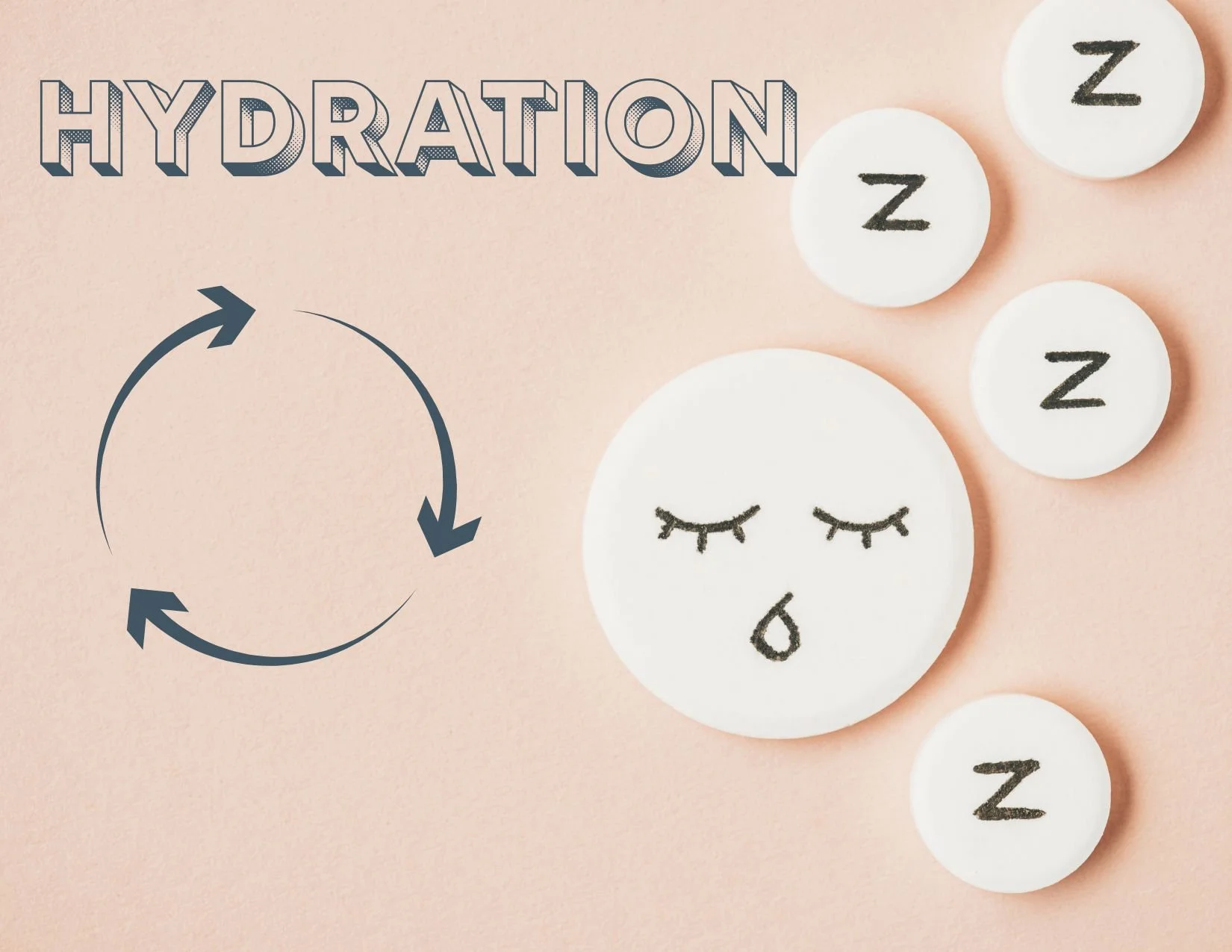The Sneaky Connection Between Hydration and Sleep
Our bodies are about 50-70% water, so it stands to reason that it plays a crucial role in our health. You may already know that water regulates body temperature; maintains blood volume and blood pressure; carries oxygen and nutrients to cells; is involved in metabolism; lubricates joints; protects tissues and organs; removes waste; and aids in digestion. That’s definitely enough all on its own!
But there’s another key area where proper hydration – not too little, not too much – has a huge impact. Sleep. And, like so many things in life, it’s a two-way street: dehydration affects the quantity and quality of your sleep, and your sleep quantity and quality affect your risk of dehydration.
The Feedback Loop
At the most basic level, the uncomfortable symptoms of dehydration – dry mouth, headaches, muscle cramps, and thirst – can interfere with your ability to fall asleep or stay asleep. Diving in a little more, we see that it also affects the production of melatonin, the hormone that regulates your sleep-wake cycle. The trickle down here is that low melatonin means you’ll get less deep, restorative sleep.
Turning the tables, sleep itself affects your hydration levels. Studies show that people who get fewer than 6 hours of sleep per night are 59% more likely to be dehydrated the next day. The reason comes down to another hormone that’s important to your shut-eye – vasopressin. During the later stages of sleep, the body releases vasopressin to help retain water. Fragmented or shortened sleep interferes with this and leads to more fluid loss, which means you’re more likely to start the day dehydrated.
And, guess what? Sleep deprivation can even interfere with your ability to recognize thirst, which means you might not drink enough water to rehydrate yourself the next day.
And so the cycle continues….
The Conundrum
The key to getting things back in balance is to hydrate throughout the day and adopt other healthy habits to support better sleep. (Haven’t we talked about no screen time before bed? And how about developing an evening routine like herbal tea, gentle yoga, or an epsom salt bath to signal to your body that it’s time to shut down?)
Ok, so staying hydrated is crucial. But, drinking too much water – especially close to bedtime – can backfire and disrupt your sleep with frequent trips to the bathroom. Feels like a no-win, doesn’t it?
Well, with just a few tips, you can have the best of both worlds.
The Solution
First, let’s start with how much water you should be drinking.
As a general rule, you want to go for half your body weight expressed in ounces – so if you weigh 150 lbs., you’d ideally have 75 ounces of water per day. Add more to compensate for caffeine, alcohol, or intense exercise. But, don’t go over 100 ounces without a doctor's guidance – no matter what you weigh – because it can disrupt your body’s electrolyte balance.
Within those parameters, try these a.m. and p.m. tips.
Daily Hydration Habits:
Spread it out: Sip water consistently throughout the day rather than chugging large amounts at once.
Front-load your fluids: Aim to drink about half of your water earlier in the day. And don’t wait until you feel thirsty – that’s a sign that you’ve waited a little too long.
Eat water-rich foods: Include fruits and vegetables like cucumbers, oranges, and watermelon in your diet for added hydration.
Check your urine: Pale yellow urine usually indicates proper hydration.
Evening Routine:
Wind down with less fluid: Gradually decrease your water intake after dinner.
Monitor evening intake: Reduce fluid consumption 1–2 hours before bedtime. (Huh. That’s about the same time you should be putting those screens away…. How convenient! 🙃)
Listen to your body: Watch for signs of dehydration, but avoid forcing extra fluids late in the evening.
Limit caffeine and alcohol: Both can dehydrate you and disrupt sleep.
Create a bedtime routine: Going to bed and waking up at the same time each day helps regulate your body’s natural rhythms, including thirst cues.
Extra Risks
Some groups and situations require extra attention to hydration and sleep. Here’s where:
Older adults -- As we age, our sense of thirst diminishes. We're also at increased risk of both dehydration and nocturia (frequent waking to urinate at night). Older adults should monitor their fluid intake and adjust as needed.
Athletes and active individuals -- Exercise increases fluid loss through sweat. Always hydrate before, during, and after. If you work out in the evening, rehydrate after your session, but give your body time to process fluids before bed.
Hot or humid environments -- High temperatures and humidity can lead to greater fluid loss. Adjust your hydration accordingly, but be mindful of your evening intake and/or exceeding 100 ounces without a doctor’s advice.
Medical conditions -- Certain conditions (like diabetes or kidney issues) and medications (such as diuretics) can affect hydration and urination patterns. Consult your doctor for personalized advice.
The Same Coin
When you think about it, hydration and sleep are two sides of the same coin. They’re truly inseparable and both have lasting impact on your mood, metabolism, focus, and overall health. Using a two-pronged approach by focusing on both hydration and sleep habits is the best way to optimize the benefits of both.
And, of course, proper nutrition supports it all. If sleep is a persistent issue for you, there’s so much we can do just by addressing your diet. Curious what that looks like? Click below to request a free session and let’s chat!


